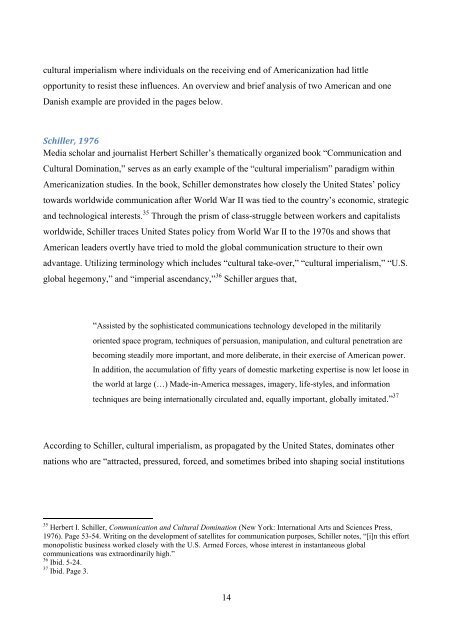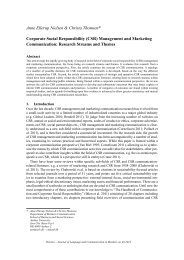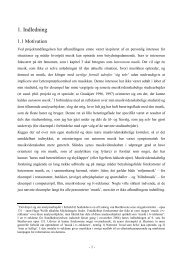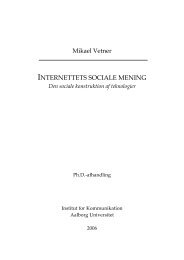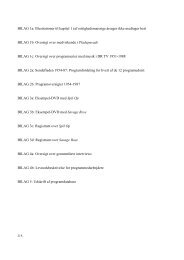- Page 1 and 2: 1. Introduction The Jeremiad Over J
- Page 3 and 4: Specifically this dissertation look
- Page 5 and 6: Americanization of Danish journalis
- Page 7 and 8: emphasizes moving from ―research
- Page 9 and 10: Americanization of Danish journalis
- Page 11 and 12: pre-condition for Americanization i
- Page 13: devoted to their study. 31 Based on
- Page 17 and 18: ―Americanization is a cousin to a
- Page 19 and 20: abounds with references to American
- Page 21 and 22: 2.1.2 Assimilation The most promine
- Page 23 and 24: experience as a visiting scholar in
- Page 25 and 26: 2.1.3 Power Asymmetry The most prev
- Page 27 and 28: argues that Americanization is not
- Page 29 and 30: The third wave of Americanization c
- Page 31 and 32: view of Americanization which means
- Page 33 and 34: cultural imperialism paradigm must
- Page 35 and 36: and on the right a threat to nation
- Page 37 and 38: Villaumes study of the period betwe
- Page 39 and 40: systematically sought to influence
- Page 41 and 42: Through these conscious efforts, th
- Page 43 and 44: Kryhl Jensen, 2009 Building partial
- Page 45 and 46: content analysis focusing on change
- Page 47 and 48: any kind. 147 Consequently, Schudso
- Page 49 and 50: first president was Johan van der K
- Page 51 and 52: only places for reporters' opinions
- Page 53 and 54: Mancini, when discussing convergenc
- Page 55 and 56: emphasis on scandals, conflicts, an
- Page 57 and 58: ―commercial pressures have intens
- Page 59 and 60: "Only in imaginary experience (in t
- Page 61 and 62: like the press and publishing, beca
- Page 63 and 64: The discussion concerning agency ov
- Page 65 and 66:
―The Agenda-Setting Function of t
- Page 67 and 68:
De Vreese emphasizes that, ―frame
- Page 69 and 70:
symbolic level, key actors on both
- Page 71 and 72:
importance of Danish participation
- Page 73 and 74:
thereby support the politicians‘
- Page 75 and 76:
―The audience consisted of more t
- Page 77 and 78:
Vietnam War and domestic as well as
- Page 79 and 80:
Schröter, however, argues that des
- Page 81 and 82:
proponents of government regulation
- Page 83 and 84:
approach of United States in the 19
- Page 85 and 86:
―TV-stations in Europe are fully
- Page 87 and 88:
Conclusion This section has shown t
- Page 89 and 90:
part of the clickety-clack pressroo
- Page 91 and 92:
that the United States is still the
- Page 93 and 94:
VT71 with 24K) with cable-connected
- Page 95 and 96:
4. Symbolic Americanization Address
- Page 97 and 98:
4.1 Transmission ―Danes,‖ wrote
- Page 99 and 100:
statements which have been received
- Page 101 and 102:
As a part of Washington‘s conscio
- Page 103 and 104:
of the United States to attention d
- Page 105 and 106:
―Short of a trip to the United St
- Page 107 and 108:
that Danish journalists would appre
- Page 109 and 110:
from Danish journalists who had act
- Page 111 and 112:
Schlüter, ― could as of yet only
- Page 113 and 114:
enhanced the opportunity to get off
- Page 115 and 116:
Forum Service with splendid article
- Page 117 and 118:
―Had far ranging talk with Jens N
- Page 119 and 120:
eport more positively on the United
- Page 121 and 122:
The impressions gathered from trave
- Page 123 and 124:
Roll was happy to report in July 19
- Page 125 and 126:
4.2.2 The exchanged journalists The
- Page 127 and 128:
experience and their greater unders
- Page 129 and 130:
year.‖ Throughout the year, Krab-
- Page 131 and 132:
Moreover, Krab-Johansen‘s own eva
- Page 133 and 134:
university. This stipend, supported
- Page 135 and 136:
one thing only, from their interact
- Page 137 and 138:
Talese‘s style in his 1962 articl
- Page 139 and 140:
Despite the uncertainty of what act
- Page 141 and 142:
Knud Buchardt returned to theme of
- Page 143 and 144:
course in early 1985 he incorporate
- Page 145 and 146:
important examples of transmission,
- Page 147 and 148:
To Schierbeck the book describing W
- Page 149 and 150:
journalism was taking shape within
- Page 151 and 152:
the American ‗Investigative Repor
- Page 153 and 154:
ethical standards,‖ and the newsp
- Page 155 and 156:
The German journalist Günher Wallr
- Page 157 and 158:
the government with an eye to its r
- Page 159 and 160:
According to Voss and van der Brugg
- Page 161 and 162:
facts should speak for themselves.
- Page 163 and 164:
commercialization (or Americanizati
- Page 165 and 166:
and self-consciously diverges from
- Page 167 and 168:
three Danish and three American new
- Page 169 and 170:
in political campaigns. 522 To ensu
- Page 171 and 172:
Officin [Berlingske Printing House]
- Page 173 and 174:
First a comparison of 100 articles
- Page 175 and 176:
Based on the results described belo
- Page 177 and 178:
70 60 50 40 30 20 10 0 Issue news P
- Page 179 and 180:
60 50 40 30 20 10 0 Table 11 - Perc
- Page 181 and 182:
In relation to H1 the results betwe
- Page 183 and 184:
Like The New York Times, Los Angele
- Page 185 and 186:
70 60 50 40 30 20 10 0 Table 18 - P
- Page 187 and 188:
Yet, the relatively infrequent use
- Page 189 and 190:
ased on commercial pressure. Berlin
- Page 191 and 192:
The publicly owned newspaper Berlin
- Page 193 and 194:
90 80 70 60 50 40 30 20 10 0 Soft N
- Page 195 and 196:
slight decline in the use of interp
- Page 197 and 198:
25 20 15 10 5 0 Table 32 - Percenta
- Page 199 and 200:
instead of substance in election co
- Page 201 and 202:
memoirs. 563 100 90 80 70 60 50 40
- Page 203 and 204:
90 80 70 60 50 40 30 20 10 0 Descri
- Page 205 and 206:
60 50 40 30 20 10 0 Descriptive new
- Page 207 and 208:
with a reply in the article. Based
- Page 209 and 210:
Berlingske Tidende, which historica
- Page 211 and 212:
Based on the above results hypothes
- Page 213 and 214:
For Politiken the percentage of har
- Page 215 and 216:
newspapers goal to become a more se
- Page 217 and 218:
Ekstra Bladet though this developme
- Page 219 and 220:
Pundik had, for example, visited Th
- Page 221 and 222:
that Politiken in 1971 adopts a pol
- Page 223 and 224:
need for a more nuanced description
- Page 225 and 226:
striks among journalist‘s within
- Page 227 and 228:
orrowings.‖ 613 On the other hand
- Page 229 and 230:
•British liberation •British in
- Page 231 and 232:
normative expectations and aspirati
- Page 233 and 234:
the years, and the documents that r
- Page 235 and 236:
Furthermore, studying American and
- Page 237 and 238:
detrimental to several American new
- Page 239 and 240:
7. Conclusion Through archival and
- Page 241 and 242:
structural and symbolic Americaniza
- Page 243 and 244:
———. On Television. Translate
- Page 245 and 246:
Døcker, Henrik. "Rejsen Til USA's
- Page 247 and 248:
Isager, Christine. "Skribenter Der
- Page 249 and 250:
Presse/Pressemeddelelser/2010/Novem
- Page 251 and 252:
Nielsen, Signe Højgaard, and Mathi
- Page 253 and 254:
———. "Visit by Information Of
- Page 255 and 256:
———. "Fyrre Indianere På Smu
- Page 257 and 258:
English Summary This dissertation e
- Page 259 and 260:
promote public debate, a key compon
- Page 261 and 262:
i Danmark, oparbejdelsen af personl


